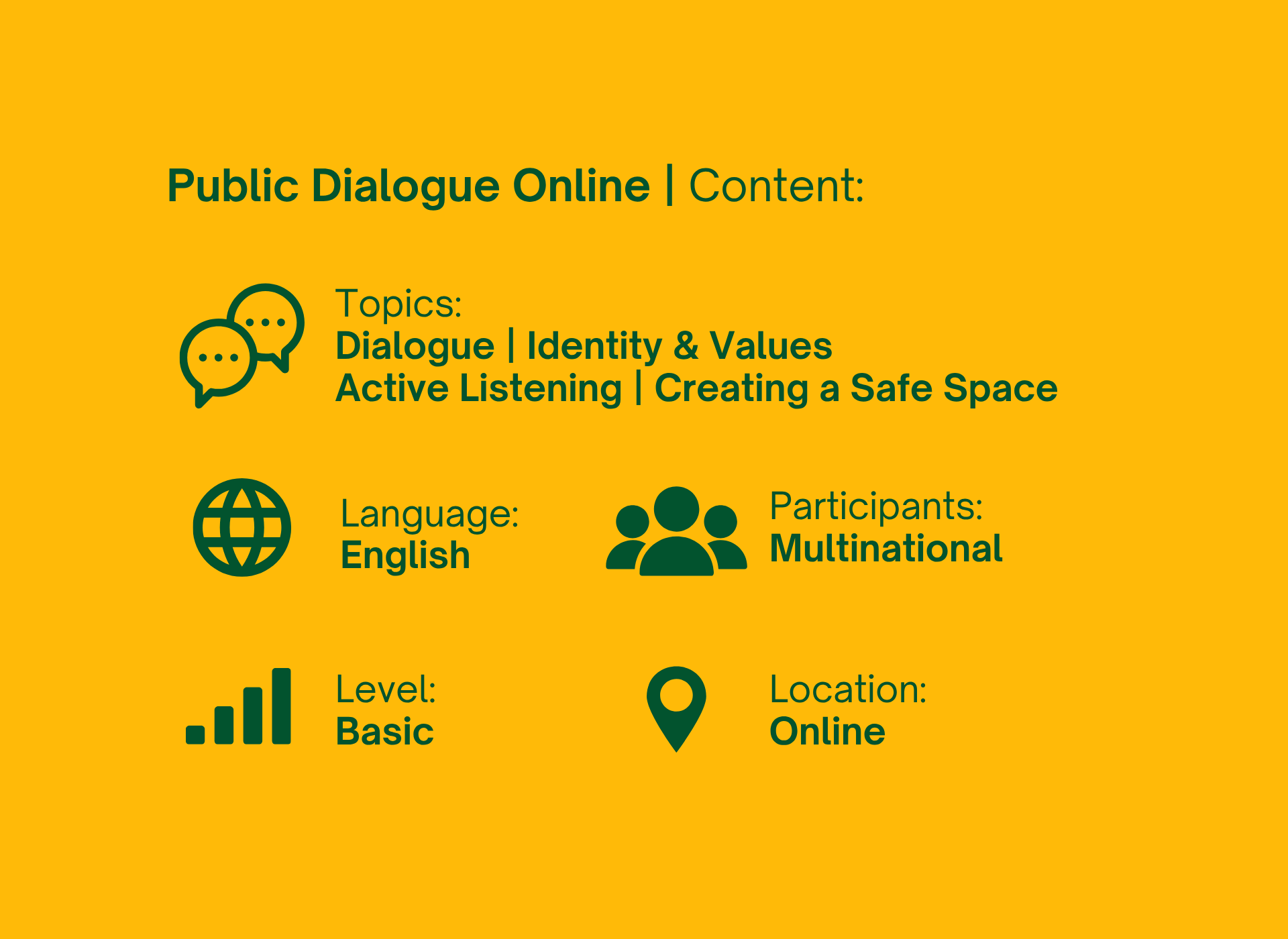New! Basic introduction to public dialogue. Get insights in how the method can be used to fascilitate and organize public dialogue about sensitive, conflicted or controversial topics in your community or professional practice.
Public dialogue is a facilitated dialogue for citizens about a topic of public interest. It provides a safe – and brave - space to meet, share, listen and reflect, and the approach is particularly useful for addressing sensitive, conflicted, or controversial topics. It can contribute to strengthening communities and their sense of belonging and togetherness despite disagreement.
Public dialogues can contribute to:
- Important conversations connected to happenings, events,conflicts and incidents in a community
- Build and strengthen relationships within communities
- Counter polarization and tensions
- Create inclusive processes and decision-making
- Empower minority voices and people of any background
Knowledge
After the training you will:
- Understand what dialogue and public dialogue are, according to the Nansen Center for Peace and Dialogue.
- Understand how public dialogue can be meaningfully applied in your context or practice.
- Know how to create conditions that enable public dialogue
- Get ideas how dialogue can be used in change processes
- Understand how constructive feedback contributes to learning in a dialogue-based process
Skills
You will train your ability to;
- Ask reflective and dialogical questions
- Support and maintain a space that encourages equitable participation and trust.
- Recognize how your identity, background, and assumptions influence your communication and reactions.
- Stay grounded and multi-partial in complex or emotionally charged situations.
Tools:
In the training you will practice how to
- Offer and receive constructive feedback as a tool for deepening awareness and learning.
- Formulate open and reflective opening and following up questions
- Listen actively
COURSE COMPONENTS:
1. Dialogue
- Dialogue as a method, perspective, and approach
- Different forms of public dialogue
2. Identity and values:
- Reflect on your identity, values and assumptions, and how these reflect into your reactions in a dialogical space
3. Active Listening and Asking Good Questions
- Practice and insight into active listening
- How listening affects us
- The art of developing and asking opening questions
- The art of asking follow-up questions
4. Creating a Safe Space
- What is a safe, brave and dialogical space?
- How to create a safe, brave and dialogical space
- Introduction to the role of the facilitators and their responsibilities
- Practical exercise in facilitating public dialogues
Who is the training suitable for?
Anyone who wants to organize inclusive and dialogical public conversations – in a neighborhood, at the workplace, or to highlight important conversations in local communities. This course is structured so that each participant can use the given tools and exercises afterwards, both privately and professionally.
Read more about Nansen Dialogue Approach.
Practical information
DURATION: 5 days | 4 hours per day
DATE: November 10 - 12 and November 17 – 18 2025
TIME: 11:00–15:00 (CET)
LANGUAGE: English
PARTICIPANTS: Max 14 persons
FEE: EUR 400
APPLICATION DEADLINE: October 30th.
Based on assessment of personal applications and group composition, Nansen Peace Center grants participation in the training. We advice you to apply as soon as you can.
The course does not provide any formal certification, but you will receive a document showing proof of completion at the NCPD.
PARTICIPATING in this course will make you eligible to the advanced trainings in dialogue facilitation.
DIALOGUE is a facilitated conversation based on active listening and explorative questions.
PUBLIC DIALOGUE is a facilitated dialogue for citizens about a topic of public interest. It provides a safe – and brave - space to meet, share, listen and reflect, and the approach is particularly useful for addressing sensitive, conflicted, or controversial topics. It can contribute to strengthening communities and their sense of belonging and togetherness despite disagreement.

